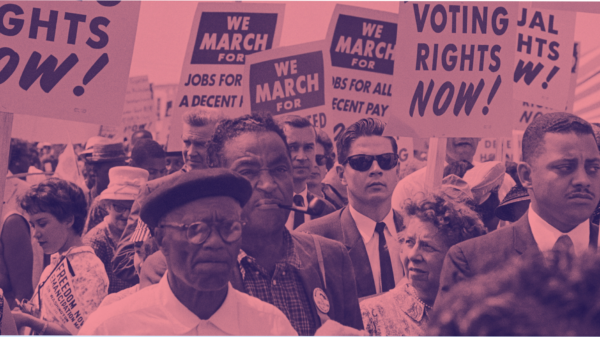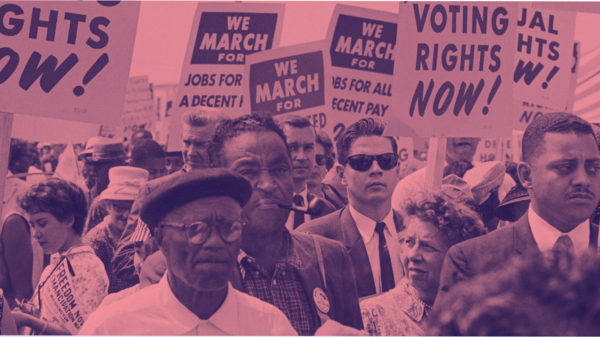Originally published in Bay to Bay News.
By: Representative Larry Lambert
Sixty years after its enactment, the Voting Rights Act — championed by civil rights icons like Rep. John Lewis — remains one of the most critical tools for protecting our right to vote. It has laid the foundation for historically marginalized voters — like voters of color, voters whose first language is not English, and voters from vulnerable communities — to push back against discriminatory voting laws.
However, the act has been the target of recent assaults on our democracy.
On Oct. 15, the U.S. Supreme Court heard oral arguments in a critical voting rights case challenging the creation of a second majority-Black congressional district in Louisiana. Black voters filed a lawsuit after state officials passed Louisiana’s 2022 congressional maps, which included only one majority-Black district, despite Louisiana being home to the third-highest population of African Americans in the country. Lower courts agreed that the map violated Section 2 of the VRA and ordered the state to create a second majority-Black district.
The U.S. Supreme Court signaled in its Oct. 15 oral argument that it will likely invalidate the creation of the district. This would not only be disastrous for Black voters in Louisiana, but also, depending on how the court rules, the historic Voting Rights Act could face yet another devastating blow.
Over the past 15 years, the VRA has been steadily chipped away, leaving what was often described as the crown jewel of the civil rights era a shell of its former self. In 2013, the court gutted Section 5, which required places that had a demonstrated history of racial discrimination in voting to get preclearance from the federal government before changing election laws or policies. In the wake of this decision, states created a wave of new restrictions — like unnecessary proof of citizenship requirements and polling site closures — making it harder for Black and Brown people to vote.
Since then, the court has continued to make it harder for civil rights groups to successfully bring challenges of racial discrimination in voting to federal courts, leaving many voters without protection against politicians who seek to disenfranchise them.
The right to vote is sacred and must be above partisan manipulation. Every elected official across the nation should advocate for laws that ensure that every eligible voter, regardless of what he or she looks like or where he or she lives, can cast ballots freely and fairly.
That is why I plan to introduce a state-level Voting Rights Act for Delaware in 2026. Eight states, including Virginia, Connecticut and Minnesota, have already passed these laws. Nine others, including neighbors Maryland and New Jersey, have introduced them. Even conservative states, like Florida and Alabama, have recently introduced such legislation.
A state-level Voting Rights Act would guarantee that Delaware elections are conducted without racial discrimination, ensure that legislative districts do not disenfranchise historically marginalized groups and provide language assistance to new American voters to ensure that they understand complicated voting rules and procedures.
While the civil rights era of the 1950s and ’60s may seem far removed for many, discriminatory effects that deny many voters — particularly Black and Brown voters — equal opportunities to participate in the political process persist to this day. Since the federal VRA was weakened in 2013, at least 31 states have passed 103 restrictive voting laws that limit voting access, making registering to vote harder and restricting people’s ability to assist voters. Some have also enacted new legislative maps that dilute the voting power of racial minorities. If we allow the federal act to become toothless, without responding at the state and local levels, we risk backsliding even further into bad practices that disenfranchise historically marginalized groups.
While I believe our state’s election officials do an excellent job making democracy a reality each election, Delaware is not immune from attacks on voting rights.
Many people may wonder why Delaware needs such a law. While I believe our state’s election officials do an excellent job making democracy a reality each election, Delaware is not immune from attacks on voting rights. Racial and national origin disparities in democratic participation persist. The passage of a state-level Voting Rights Act will guarantee that our state remains a place where racial discrimination is not tolerated in our elections, and most importantly, it will give voters and advocates the legal tools to fight back against potential attempts to enact restrictions.
In addition, the passage of a Delaware Voting Rights Act will send a powerful message nationwide: While the federal government may seek to curtail the power of the landmark federal VRA, the First State will continue to push back against attacks on democracy until every vote counts and every voice is heard, and we will follow through on that commitment with tangible action. By joining a growing chorus of states with a state-level Voting Rights Act, Delaware will not only be taking proactive action to ensure voters the protections we deserve but bolstering the courage of other states to enact their own protections.
In today’s world, I believe each of us must clearly define what our values are and take action to advance those values. I strongly believe that every eligible person should be able to cast his or her ballot freely and fairly, and that we, as a nation, must take meaningful steps to undo the historical discrimination that many Black and Brown people have encountered when trying to exercise their constitutional rights to vote. The federal VRA has been a powerful tool to help achieve those goals. Regardless of what the U.S. Supreme Court rules, it is time for Delaware to enact a state-level Voting Rights Act that reaffirms our values and ensures that our elections remain free from discrimination.



